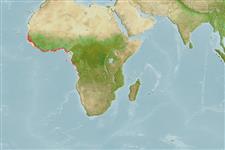Teleostei (teleosts) >
Pleuronectiformes (Flatfishes) >
Soleidae (Soles)
Etymology: Dagetichthys: After Daget, French malacologist; he studied African fishes and Bivalves.
Environment: milieu / climate zone / depth range / distribution range
Ecology
Marine; brackish; demersal; depth range 0 - 125 m (Ref. 2683). Tropical; 21°N - 18°S, 19°W - 14°E
Eastern Atlantic: Cape Blanc (Mauritania) to Angola (Ref. 6805). Also in Mediterranean (Ref. 4710).
Size / Weight / Age
Maturity: Lm ? range ? - ? cm
Max length : 40.0 cm TL male/unsexed; (Ref. 6805); max. published weight: 468.00 g (Ref. 126428)
Dorsal spines (total): 0; Dorsal soft rays (total): 73 - 83; Anal spines: 0; Anal soft rays: 57 - 67. Diagnosis: body oval, elongate, flat and asymmetric (Ref. 57416), hind part tapering (Ref. 4710). Eyes located on right side of head, except in reversed individuals (Ref. 57416). Upper eye its own diameter or more from dorsal profile of head; anterior nostril on blind side not enlarged; anterior nostril on eyed side with backward-pointing tube not reaching front border of lower eye (Ref. 4710). Preopercle covered by skin and opercle entirely scaled; mouth arched and inferior; dorsal and anal fins lacking spinous rays and confluent with caudal fin, no distinct caudal peduncle; last dorsal and anal rays not shorter than preceding rays and broadly united to outer caudal rays; dorsal fin originating on anterior profile of head; pectoral fins present on both sides with 6-10 rays; straight part of lateral line visible, supratemporal part slightly arched above eyes; body covered with ctenoid scales (Ref. 57416).
Found on sand or mud bottoms (Ref. 2683, 4710) in shallow waters, from the shore to 60 m (Ref. 4710). No information available on diet or reproduction (Ref. 4710). Maximum depth from Ref. 122917.
Life cycle and mating behavior
Maturity | Reproduction | Spawning | Eggs | Fecundity | Larvae
Vachon, J., F. Chapleau and M. Desoutter-Meniger, 2007. Révision taxonomique et phylogénie de Dagetichthys et Synaptura (Soleidae). Cybium 31(4):401-416. (Ref. 80029)
IUCN Red List Status (Ref. 130435: Version 2024-1)
Threat to humans
Harmless
Human uses
Fisheries: commercial
Tools
Special reports
Download XML
Internet sources
Estimates based on models
Preferred temperature (Ref.
123201): 23.2 - 28, mean 26.6 °C (based on 80 cells).
Phylogenetic diversity index (Ref.
82804): PD
50 = 0.7500 [Uniqueness, from 0.5 = low to 2.0 = high].
Bayesian length-weight: a=0.00977 (0.00466 - 0.02049), b=3.07 (2.90 - 3.24), in cm total length, based on LWR estimates for this (Sub)family-body shape (Ref.
93245).
Trophic level (Ref.
69278): 3.1 ±0.26 se; based on food items.
Resilience (Ref.
120179): Medium, minimum population doubling time 1.4 - 4.4 years (Preliminary K or Fecundity.).
Fishing Vulnerability (Ref.
59153): Low to moderate vulnerability (30 of 100).
Nutrients (Ref.
124155): Calcium = 156 [57, 342] mg/100g; Iron = 0.911 [0.425, 1.871] mg/100g; Protein = 17.8 [16.1, 19.7] %; Omega3 = 0.122 [0.059, 0.236] g/100g; Selenium = 61 [27, 125] μg/100g; VitaminA = 13.8 [4.3, 44.5] μg/100g; Zinc = 1.18 [0.77, 1.73] mg/100g (wet weight);
